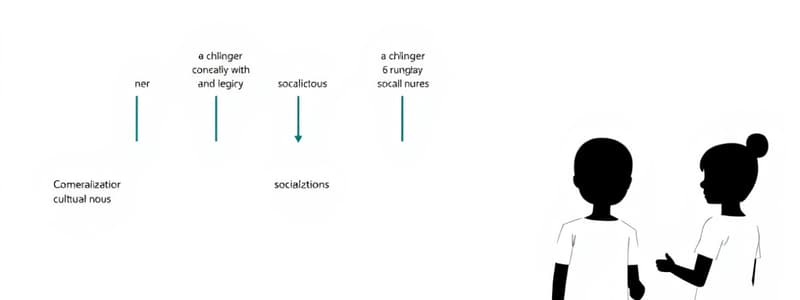Podcast
Questions and Answers
What is socialization?
What is socialization?
- The process by which people learn customs and values of their culture (correct)
- The process of acquiring wealth
- The process of exchanging goods
- The process of physical development
What are patterns in socialization?
What are patterns in socialization?
Patterns relate to how people are expected to conform to the values, beliefs, norms, attitudes, and new knowledge.
Informal socialization occurs within organizations.
Informal socialization occurs within organizations.
False (B)
Formal socialization takes place in settings intentionally designed for that purpose.
Formal socialization takes place in settings intentionally designed for that purpose.
Participatory socialization allows a child to be ____.
Participatory socialization allows a child to be ____.
Why is socialization important?
Why is socialization important?
Which of the following is NOT a benefit of socialization?
Which of the following is NOT a benefit of socialization?
What is primary socialization?
What is primary socialization?
Flashcards are hidden until you start studying
Study Notes
Socialization Overview
- Socialization is the process through which individuals learn the customs, values, norms, attitudes, and behaviors necessary to function within their culture.
- It encompasses acquiring new skills, knowledge, and understanding what is expected in society.
Types of Socialization
- Patterns of Socialization: Refers to the expectations placed on individuals to conform to societal values and norms as they gain knowledge and experience.
- Informal Socialization: Occurs naturally through interactions with peers and more experienced individuals, typically outside of structured environments like schools or organizations.
- Formal Socialization: Takes place in intentional settings designed for the purpose of socialization, such as educational institutions and organizations.
- Participatory Socialization: Allows children to engage actively, fostering independent learning and skill development.
Importance of Socialization
- Transformation from Biological to Social Being: Socialization is crucial for communication skills; isolated individuals (e.g., feral children) often struggle with language and social behavior due to lack of interaction.
- Discipline and Conformity: Teaches individuals to adhere to social norms and values, thus helping maintain order within society.
- Role Enactment: Different societal roles are assigned based on gender and social structure; men may hold dominant roles while women tend to occupy expressive roles in patriarchal systems.
- Skill Acquisition: Provides essential knowledge and skills for everyday functioning and occupational success.
- Aspirational Development: Helps individuals form and pursue meaningful life goals.
- Stability of Social Order: Conforming to assigned roles aids in the smooth functioning of society by ensuring cooperation among members.
Primary Socialization
- Occurs primarily during childhood, focusing on developing language, self-identity, cognitive skills, and moral understanding.
- Internalizes societal roles, attitudes, and emotional responses essential for navigating social interactions.
Studying That Suits You
Use AI to generate personalized quizzes and flashcards to suit your learning preferences.



